Related Research Articles

Huntington County is a county in the U.S. state of Indiana. According to the 2020 United States Census, the population was 36,662. The county seat is Huntington. Huntington County comprises the Huntington, Indiana micropolitan statistical area and is included in the Fort Wayne–Huntington–Auburn Combined Statistical Area.

Delaware County is a county in the east central portion of the U.S. state of Indiana. As of 2020, the population was 111,903. The county seat is Muncie.

Warren is a town in Salamonie Township, Huntington County, Indiana. The population of Warren was 1,182 at the time of the 2020 census.

The Wabash River is a 503-mile-long (810 km) river that drains most of the state of Indiana, and a significant part of Illinois, in the United States. It flows from the headwaters in Ohio, near the Indiana border, then southwest across northern Indiana turning south near the Illinois border, where the southern portion forms the Indiana-Illinois border before flowing into the Ohio River.
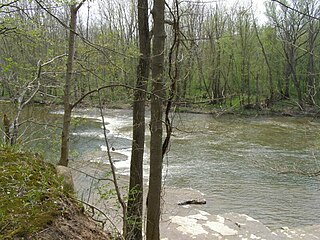
The Mississinewa River is a tributary of the Wabash River in eastern Indiana and a small portion of western Ohio in the United States. It is 120 miles (190 km) long and is the third largest tributary behind the White and Little Wabash Rivers, only slightly larger than the Embarras and Vermilion Rivers. Via the Wabash and Ohio rivers, it is part of the Mississippi River watershed.

State Road 18 (SR 18) in the U.S. State of Indiana is an east–west route in North Central Indiana running from the Illinois border in Benton County almost to the Ohio border, terminating at U.S. Route 27 (US 27)/State Road 67 (SR 67) in Jay County. State Route 18 is mainly a 2-lane road with exception of 4-lane divided highway from Marion to Interstate 69 (I-69). Marion is the only considerably large city that Route 18 passes through. State Route 18 runs just south of the lakes region, with Lake Shafer, Lake Freeman, Mississinewa Reservoir, and Salamonie Reservoir not too far to the north. With the exception of Marion, Route 18 passes through mostly small towns. The terrain is mostly level and is utilized mostly for agriculture.
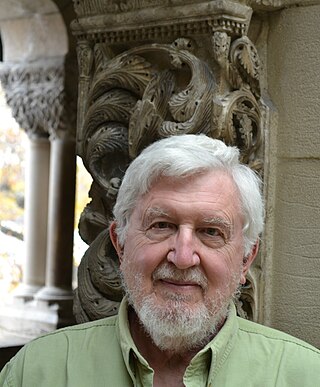
Jared Carter is an American poet and editor.

Butler Township is one of fourteen townships in Miami County, Indiana, United States. As of the 2020 census, its population was 826 and it contained 360 housing units.

Lagro Township is one of seven townships in Wabash County, Indiana, United States. As of the 2020 census, its population was 2,733 and it contained 1,194 housing units.

Liberty Township is one of seven townships in Wabash County, Indiana, United States. As of the 2020 census, its population was 2,191 and it contained 979 housing units.

Waltz Township is one of seven townships in Wabash County, Indiana, United States. As of the 2020 census, its population was 1,199 and it contained 568 housing units.
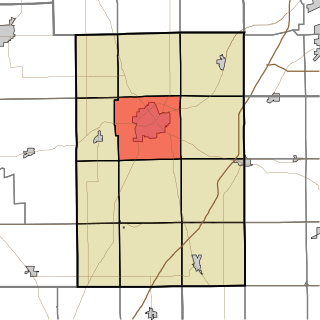
Huntington Township is one of twelve townships in Huntington County, Indiana. As of the 2020 census, its population was 20,326, making it the most populous township in the county.

Polk Township is one of 12 townships in Huntington County, Indiana, United States. As of the 2020 census, its population was 464.

Chester Township is one of nine townships in Wells County, Indiana, United States. As of the 2020 census, its population was 954 and it contained 379 housing units.
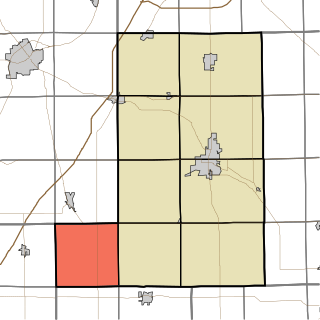
Jackson Township is one of nine townships in Wells County, Indiana, United States. As of the 2020 census, its population was 771 and it contained 310 housing units.

Liberty Township is one of nine townships in Wells County, Indiana, United States. As of the 2010 census, its population was 1,086 and it contained 438 housing units.

Rockcreek Township is one of nine townships in Wells County, Indiana, United States. As of the 2020 census, its population was 1,593 and it contained 679 housing units.

Elizabethtown was a small, now extinct town in Washington Township, Delaware County, Indiana, United States. The town was platted in the early 19th century and was located along the north bank of the Mississinewa river in section 12, of Washington Township, in Delaware County, Indiana.
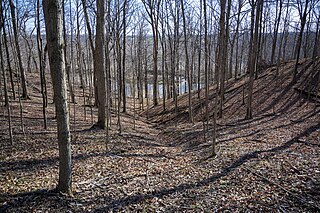
Frances Slocum State Forest is 516 acres of natural land managed by the Indiana Department of Natural Resources.
References
- ↑ "Monument City - Ghost Towns".
- ↑ "Monument City Memorial Cemetery, Huntington County, Indiana". Archived from the original on May 11, 2008.
- ↑ History of Huntington County, Indiana: From the Earliest Time to the Present, with Biographical Sketches, Notes, Etc., Together with a Short History of the Northwest, the Indiana Territory, and the State of Indiana. Published by Walsworth Publishing Co., 1887. Original from Indiana University.
- ↑ Disis, Jill (July 26, 2012). "Drought reveals an Ind. city under a reservoir" . Retrieved December 12, 2016.
- ↑ "Monument City". Archived from the original on April 30, 2012.
- ↑ "Mississinewa Reservoir at Winter Pool". Archived from the original on February 22, 2012.
- ↑ Emmanuel, Lenny (March 1, 2009). "A Conversation with Jared Carter".